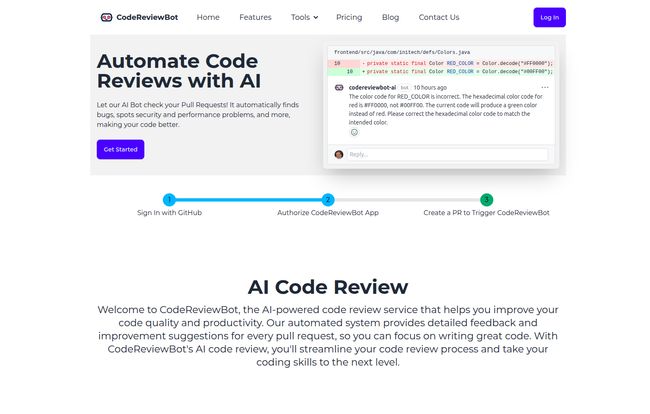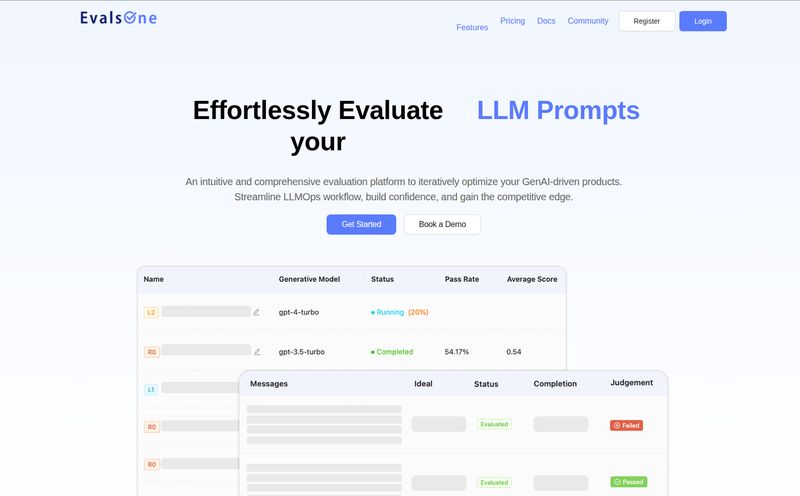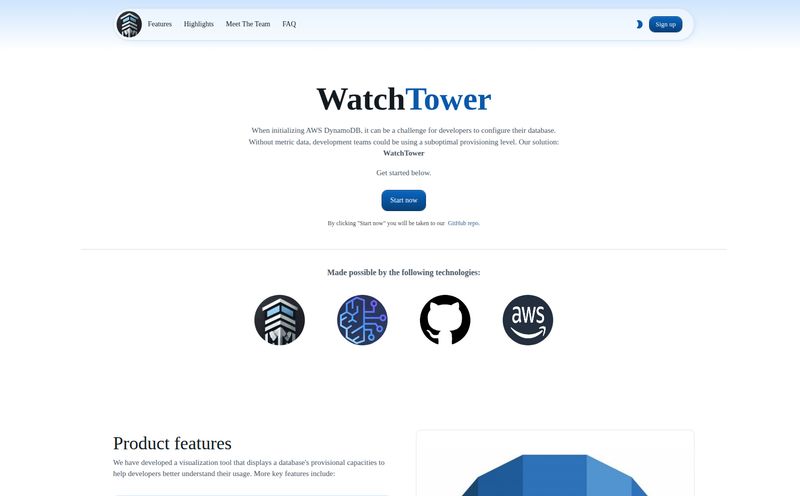The code review process can be… a drag. We've all been there. You push what you think is a masterpiece, only to have it sit in the pull request (PR) queue for days, waiting for that one senior dev who has a spare moment. When they finally get to it, the feedback is a mix of critical architectural points and nitpicky comments about trailing whitespace. It's necessary, I get it, but it's a bottleneck. A huge one.
For years, we've just accepted this as the cost of quality. But what if it didn't have to be? I've been keeping a close eye on the rise of AI-powered developer tools, and I've seen everything from fancy auto-complete to full-on code generation. The latest frontier? The code review itself. And a tool that recently caught my eye is CodeReviewBot.ai. It promises to automate the grunt work of code reviews, and frankly, I was skeptical but intrigued. So, I took it for a spin.
So, What is CodeReviewBot Anyway?
Think of CodeReviewBot as a tireless, always-on junior developer who has memorized every coding best practice, style guide, and security manual on the planet. Its entire job is to watch your GitHub repositories. The moment you open a pull request, it springs into action, analyzing your changes and leaving comments directly in the PR—just like a human teammate would.
It’s not just looking for syntax errors. The goal here is much bigger. It's designed to spot potential bugs, flag security vulnerabilities, and point out performance inefficiencies before they ever make it to the main branch. The whole thing plugs directly into GitHub, which for me is a massive plus. No one wants another dashboard to stare at.

Visit CodeReviewBot
The Features That Actually Matter
A features list is just a list. What I care about is how those features solve actual problems. Here’s my breakdown of what CodeReviewBot brings to the table and why it's worth paying attention to.
Automated Feedback That's Actually Useful
This is the core of the whole thing. The AI, powered by heavy hitters like OpenAI's GPT-4 and Google's models, doesn't just say "this is wrong." It explains why. Look at the example on their site: it spots an incorrect hex code for a color. It doesn't just flag it; it says, "The current code will produce a green color instead of red," and suggests the fix. That's context. That's useful.
This goes for more complex issues too, from potential SQL injection risks to inefficient loops that could slow down your application. It's like having a preliminary security and performance audit on every single PR. That's a pretty big deal.
A Tool for Learning, Not Just Correcting
Here’s something I didn’t expect to appreciate so much: the consistency. Human reviewers are, well, human. Their feedback can depend on their mood, how much coffee they've had, or how busy they are. One day they'll catch a minor naming convention issue, the next they might let it slide.
CodeReviewBot is relentlessly consistent. It provides the same high standard of feedback every single time. For junior developers, this is an incredible learning tool. It creates a steady, predictable feedback loop that helps them internalize coding standards and best practices much faster than the sometimes-chaotic feedback from a busy team. It turns the code review from a potential judgment into a constructive, educational experience.
Seamless GitHub Integration Is a Godsend
I can't stress this enough. The setup is genuinely as simple as they claim: Sign in with GitHub, authorize the app, and you're done. The next PR you create will trigger the bot. There's no complex configuration file to write, no CI/CD pipeline to wrestle with (unless you want to get into custom enterprise stuff). It just works within the environment you already live in. This low barrier to entry is smart, because developers will abandon a tool if it's a pain to set up, no matter how good it is.
My Honest Take: The Good and The Not-So-Good
No tool is perfect. Let's get into the nitty-gritty. What do I really think after kicking the tires?
What I Really Liked
The efficiency gain is undeniable. It's like cloning your most meticulous senior dev and having them handle the first pass on every PR. This frees up your actual senior developers to focus on the big-picture stuff—architecture, logic, and overall strategy—instead of getting bogged down in stylistic debates. It speeds up the entire development cycle. PRs that used to linger for days can now get an initial review in minutes.
The improvement in baseline code quality is another major win. The bot acts as a gatekeeper, ensuring a consistent standard is met before a human even lays eyes on the code. This leads to fewer bugs and a more maintainable codebase over time.
Where It Has Room to Grow
Let's be clear: this AI is not a silver bullet. It's a fantastic assistant, but it's not going to understand the business context behind a feature. It won't question if a certain architectural choice is the right one for the company's long-term goals. That still requires human intelligence and experience. Relying on it 100% without human oversight would be a mistake.
I also noticed that for the best results, you might need to tweak its rules, especially on the Pro plan. This isn't really a con, more of a heads-up. You'll want to dial it in to match your team's specific style guide. Also, a small but important note from their docs: you may need to explicitly enable code snippet suggestions in your repository options to get the richest feedback. A little inside tip for you.
Breaking Down the CodeReviewBot Pricing
Alright, let's talk money. The pricing structure seems pretty well thought out, with a tier for just about everyone. Here's how it shakes out:
| Plan | Price | Best For | Key Features |
|---|---|---|---|
| Opensource | $0 / month | Indie developers & open-source projects | 100 reviews/month on public repositories. |
| Starter | $15 / month | Small teams & freelancers | 40 reviews/month on private repositories, plus a free trial. |
| Pro | $75 / month | Growing businesses & established teams | 500 reviews/month, customizable rules, priority support. |
| Enterprise | Custom | Large organizations with specific needs | Custom integrations, self-hosting options, custom LLM, and "Everyting in pro." |
The free Opensource plan is incredibly generous and a fantastic contribution to the community. The Starter plan feels like a no-brainer for small teams working on private projects, especially with the free trial. The Pro plan is where it gets serious for businesses that want to fully integrate this into their workflow. And yes, I did notice the typo "Everyting" for the Enterprise plan on their site, and I'm choosing to believe it's a charming quirk.
Frequently Asked Questions
- What AI models does CodeReviewBot use?
- It uses a mix of powerful Large Language Models (LLMs), including OpenAI's GPT-4 and GPT-4o, as well as models from Google. This means it's leveraging some of the most advanced tech available.
- Can I actually try CodeReviewBot for free?
- Absolutely. You can use the Opensource plan for any public repository, which gives you 100 reviews a month. If you need to test it on private code, the Starter plan comes with a one-month free trial.
- Do you use my private code for AI training?
- This is the big question for any AI tool. Based on their FAQ and industry best practices, they address these concerns. For any company, it's critical to review the privacy policy, but the standard for professional tools like this is that your private code remains your private code. They are not in the business of training their models on your IP.
- I'm worried about the IP rights of the code. How is this handled?
- Similar to the training data question, the code it reviews and the suggestions it makes do not transfer any IP ownership. The tool is analyzing your code, not claiming it. Your code remains 100% yours.
- Is it hard to get started?
- Not at all. I found it surprisingly simple. It's a 3-step process that takes a few minutes: sign in with your GitHub account, authorize the application, and then just go about your work. The next PR you create will get a review.
The Final Verdict on CodeReviewBot
So, is CodeReviewBot your team's new AI pair programmer? My answer is a strong... maybe. And I mean that in the best way possible.
If your development team is feeling the friction of slow, inconsistent code reviews, this tool could be a game-changer. It's not here to replace your senior engineers, but to empower them. It's a copilot, not the pilot. By handling the first line of defense, it cleans up code, educates developers, and accelerates the entire feedback loop.
For open-source maintainers, the free plan is a gift. For small-to-medium-sized teams, the value proposition is incredibly strong. It's a practical, well-designed application of AI that solves a real, tangible problem in the software development lifecycle. It’s definitely a tool I’ll be keeping in my arsenal and recommending teams to at least try out. You might be surprised how much you enjoy having a robot on your team.



